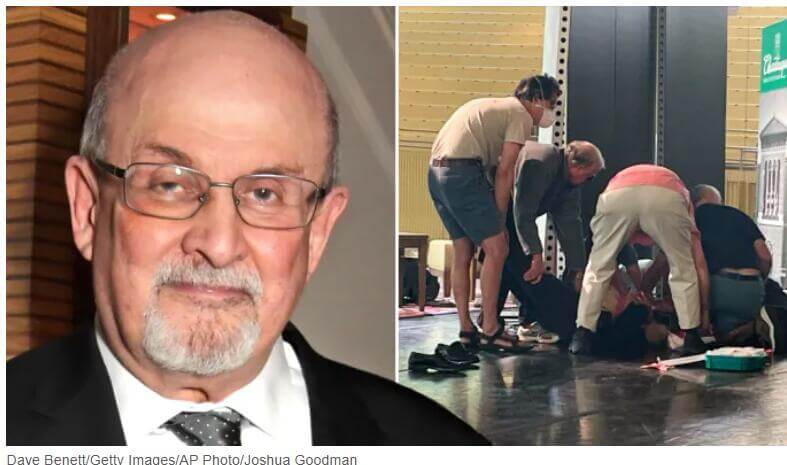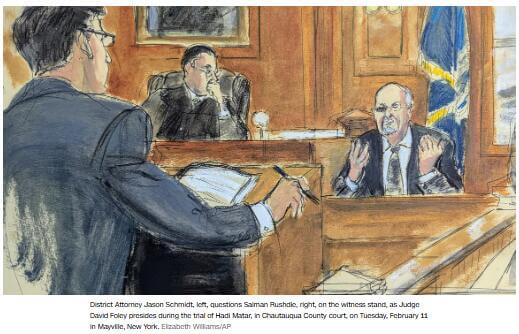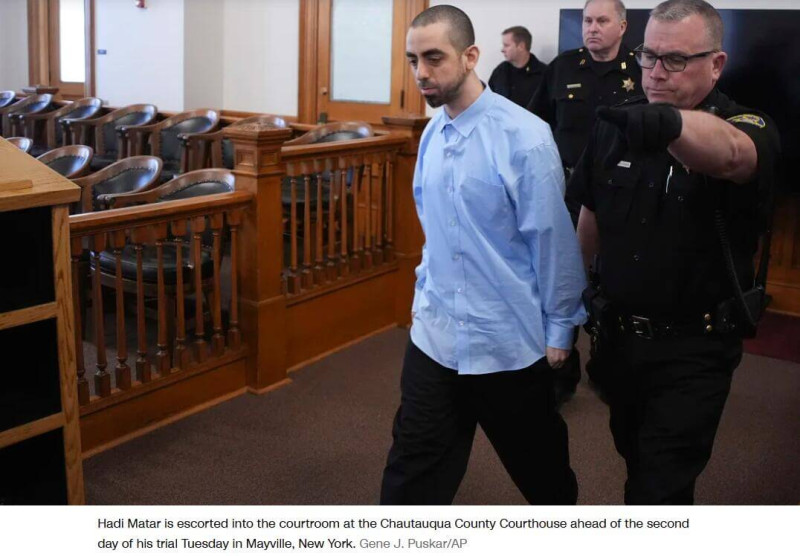
The trial of Hadi Matar, 27, has begun in Chautauqua County, New York. Matar stands accused of the attempted murder and assault of renown author Salman Rushdie during a literary event at the Chautauqua Institution in August 2022. The brutal attack left Rushdie with severe injuries, including the loss of sight in his right eye and the use of his right hand.
During his testimony, Rushdie recounted the disturbing details of the assault. He described how Matar rushed the stage and began stabbing him repeatedly. Initially, Rushdie had mistaken the blows for punches, however, he soon realized the severity of the attack when he saw his own blood. He estimated being struck approximately 15 times. One stab landed in Rushdie’s right eye and resulted in permanent blindness.
“I was aware of this person rushing at me from my right hand side,” Rushdie said as he began to testify about the events of August 12th, “He hit me very hard. Initially, I thought he had punched me. I thought he was hitting me with his fist. But very soon afterwards I saw really quite a very large quantity of blood pouring out onto my clothes, and by that time he was hitting me repeatedly. Stabbing, slashing.”
Despite the traumatic experience, Rushdie remained composed during his testimony, occasionally injecting humor. He also shared details about the painful and ongoing recovery process he has been going through, highlighting the lasting impact of some of his injuries.

The defense raised objections during the proceedings, questioning the reliability of Rushdie’s recollection due to the trauma he endured. They also tried to cast doubt on Matar’s intent, by suggesting the attack wasn’t premeditation. Matar has pleaded not guilty to the charges.
When Rushdie tesitfied, “I was very struck by his eyes, which were dark and seemed very ferocious to me.”
One of the defense lawyers for Matar objected to that statement calling it a “characterization”. Judge David Foley struck the answer from the record.
“OK, not ferocious,” Rushdie said, when District Attorney Jason Schmidt rephrased his question, asking what made the writer refer to his attacker “ferocious.”
Rushdie simply replied, “He struck me a number of times, another half a dozen times. At some point I thought I was dying.”

Since 1989, Rushdie has faced death threats following the publication of his book The Satanic Verses (1988). Iran’s supreme leader at the time, Ayatollah Ruhollah Khomeini, issued a “fatwa”, which offered a $3 million award for the assassination of Rushdie.
The fatwa sent shockwaves through the literary world, leading to attacks on translators and a publisher of foreign editions of Rushdie’s book. In 1991, Ettore Capriolo, the Italian translator of The Satanic Verses, was stabbed in his Milan apartment. Days later, the book’s Japanese translator, Hitoshi Igarashi, was stabbed to death at the university where he taught. And in 1993, William Nygaard, the publisher of Rushdie’s book in Norway, was shot near his home in Oslo but survived.
The trial is expected to wrap up in the next week. There are several testimonies to be offered from various witnesses in order to provide insight into the events of that fateful day.
Share Tweet Share Reddit Vote 0 Shares